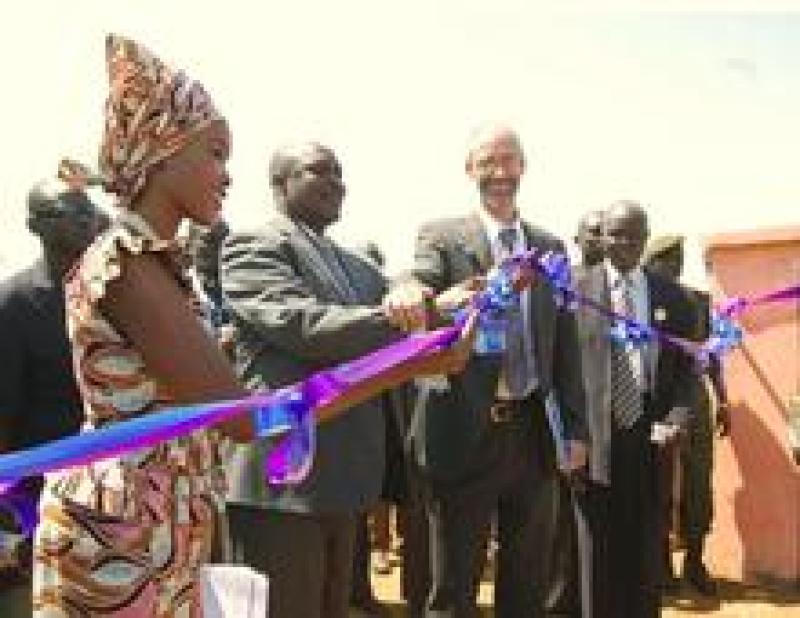

SOUTH SUDAN - The state of Eastern Equatoria inaugurated a market and received road equipment in a ceremony on 28 November. A $2.6 million livelihoods project of the South Sudan Recovery Fund supports the country in addressing the lack of market infrastructure, increasing crop productivity through agricultural training, and facilitating commercial development by connecting farmers to markets. Read more...
SOUTH SUDAN - The state government of Eastern Equatoria recently inaugurated a newly-constructed covered market and received road equipment in handover ceremonies held on 28 November in the capital Torit. Through a $2.6 million livelihoods project, South Sudan Recovery Fund has been supporting the newly independent country in addressing the lack of market infrastructure, increasing crop productivity through agricultural training, and facilitating commercial development by connecting farmers to markets. These initiatives have supported the government’s vision of making Eastern Equatoria state as one of the breadbaskets of South Sudan.
Below article from Gurtong Net by Mario Frio
TORIT, 30th November 2011 [SSRF] – In a handover ceremony held last Monday, the Eastern Equatoria State (EES) government officially opened a newly constructed model market in the capital Torit and received machinery for the construction of feeder roads.
The new market serves as a “model” for constructing marketplaces, with set infrastructure standards. The 200m x 100m covered market is equipped with separate blocks for vegetables, fish and meat, and has accessible storage facilities for surplus goods. Enclosed in concrete perimeter fence, the market has its own elevated 10,000 m3 water tank, a borehole and a pump, as well as separate blocks for wash areas and toilets.
Hon. Louis Lobong Lojore, the Governor of EES stated that, “this model market is the one visible facility that the South Sudan Recovery Fund (SSRF) has given to the people of Eastern Equatoria. The road equipment will help open up feeder roads and we shall all have access to communities in remote areas.”
The model market and the road equipment were part of a US$ 2.6 million livelihoods project intended to address the lack of market infrastructure, increase crop productivity and facilitate commercial development in Eastern Equatoria. The livelihoods projects, implemented by the Norwegian Church Aid (NCA), through the UN Development Programme (UNDP), were carried out in partnership with the State government and supported by the South Sudan Recovery Fund, a Multi-Donor Trust Fund. The Governments of the United Kingdom, the Netherlands and Norway have provided contributions to the SSRF.
State Minister of Finance, Josephine Akulang Abalang said, “I would like to give my deep appreciation to NCA and UNDP for supporting us. In 2012 and beyond, our partnership in development will grow even stronger. Together, we will make Eastern Equatoria a model State.”
Farmers and traders had previously been selling agricultural produce in an uncovered market which exposed fresh commodities to rapid deterioration. Moreover, uncovered markets lack water or sanitation facilities and have no storage rooms where surplus goods can be kept safe for selling on the next market day.
During the handover ceremonies, SSRF also officially turned over new road equipment to the State government to aid in constructing and rehabilitating feeder roads.
These roads will stimulate agricultural growth by generating market access throughout the State. Eastern Equatoria is one of the three “Greenbelt States” in South Sudan which the government is developing as the country’s food basket, by boosting its commercial agricultural production. Currently, South Sudan is dependent on basic commodity imports from neighbouring countries.
Also through the livelihoods projects, 10 women’s groups were mobilized from four counties, namely, Torit, Lopa/Lafon, Budi and Magwi. These women’s groups were composed of a total of 400 women farmers who received training on seed bed preparation, seedling production and nursery management. To provide hands-on training to these farmers, a total of 10 demonstration plots for vegetable cultivation were established in separate locations across the four selected Counties.
To ensure crop yield is sustained during the dry season, six water pumps were installed in these counties.
George Conway, UNDP Head of Office, said “Today, I am proud to be part of this partnership that will strengthen local trade and commerce, enhance the market infrastructure and build the capacity of small producers and traders, with a particular focus on women.”
Further, food storage facilities were built to ensure surplus goods are safely kept for selling on the next market day. Six storage facilities, approximately 9m x 18m were constructed in Magwi, Lafon and Budi Counties. Management and upkeep of these facilities were turned over to the women’s groups.
Photo: (L-R) Hon. Josephine Akulang Abalang, Governor Loius Lobong Lojore, and George Conway, marked the official handover of a model market [© SSRF/Maria Frio]